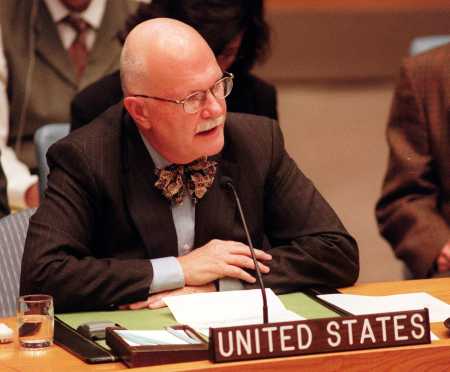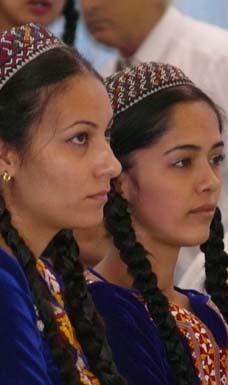
"As you know, my current assignment as Charge d'Affaires in New Delhi is far from my first trip to India - I first came to India as a Nepal-based Peace Corps volunteer in the 1960s and have been a regular visitor to this country since then, including an assignment in the Consulate General in Kolkata under the formidable former ambassador Daniel Patrick Moynihan. It is a great privilege to return to India in this role and I have enjoyed the chance to be here during your general election season and to experience the excitement of the Indian election cycle firsthand. The energy and interest of Indians in their future has been terrific to see and I have been particularly struck on my travels around India at the interest in and knowledge of the United States among people of all geographic, political and socio-economic backgrounds."
Peter Burleigh says he first came to India as a Nepal-based Peace Corps volunteer in the 1960s and have been a regular visitor to this country since then, including an assignment in the Consulate General in Kolkata under the formidable former ambassador Daniel Patrick Moynihan
The Indo-US friendship
Shyam Bhatia
The U.S. is committed to helping India bring the perpetrators of Mumbai terrorist attacks to justice, says the U.S. envoy to Delhi in an exclusive interview with Shyam Bhatia of asianaffairs. Peter Burleigh, who earlier this year was appointed Interim U.S. Ambassador to India, adds that as six American nationals were killed in Mumbai, U.S. law obliges Washington to take appropriate action for the arrest and prosecution of the terrorists involved.
AA: There is a perception among some people in Delhi that President Obama is not really all that interested in India and is at best indifferent. The same applies to the Secretary of State Clinton. Is that fair?
PB: The President and the Secretary are deeply committed to enhancing the U.S - India partnership. Our countries are linked by our shared commitments to freedom and democracy; celebrations of national diversity, human creativity and innovation; quests to expand prosperity and economic opportunity worldwide; and desires to increase our mutual security against the common threats posed by intolerance and extremism. The Obama administration awaited the conclusion of the Indian election cycle before re-launching our dialogue on important bilateral issues, although we have been consulting regularly on regional and security matters. President Obama noted in his Republic Day statement, January 26, 'Our nations have built broad and vibrant partnerships in every field of human endeavour…It is our shared values that form the bedrock of a robust relationship across peoples and governments. Those values and ideals provide the strength that enables us to meet any challenge, particularly from those who use violence to try to undermine our free and open societies.'
AA: Despite the legacy of the Cold War, are there enough people of influence in Washington who now see India as an ally, or at least a close friend of the U.S.?
PB: The strong U.S.-India relationship is reinforced daily by citizens of both our democracies, who have spoken resoundingly in favour of our partnership. One has only to look at the vast numbers of people who travel between our two nations to know that the U.S. and India are close friends and will remain so. Approximately 800,000 Americans visit India annually, an increase of more than 50 per cent since 2004. The 80,000 Indians students enrolled in U.S. colleges and universities represent the largest single group of foreign students. The strength and influence of the Indian Caucus in Congress, led by extremely influential members, and an Indian-American business community that is growing in strength and confidence pushed through the U.S. India Civil Nuclear Cooperation Initiative last year and have been strong advocates for closer relations. The Secretary of State has well-known close ties to the country; the President has actively recruited several outstanding Indian-Americans to work at the White House.
AA: If gloomy perceptions are misplaced, what can India do to boost bilateral relations? Are there still unexplored avenues such as medical and scientific research where India can somehow lead or collaborate with the U.S.?
PB: Our nations' work together covers the entire range of human endeavour and will continue to flourish and expand. Certainly medical and scientific research is one area of important partnership. I note with interest that India recorded a week without a single reported polio case for the second time this year - polio eradication is an area where U.S.-India collaboration is yielding enormous results for India's next generation who will grow up free from the scourge of polio thanks to our partnership. But our cooperation extends far beyond the health sector. We cooperate to increase regional security and stability, to counter terror in our own countries and around the world. We work together to combat climate change and develop energy efficient technologies. The Chandrayan moon mission blasted off from Indian soil carrying a payload jointly developed by U.S. and Indian scientists. There is scarcely a field of human endeavour where we are not working together, to the benefit of both of nations.
AA: What have been your impressions of India since you arrived in Delhi? For example do you see this as a friendly, open society?
PB: As you know, my current assignment as Charge d'Affaires in New Delhi is far from my first trip to India - I first came to India as a Nepal-based Peace Corps volunteer in the 1960s and have been a regular visitor to this country since then, including an assignment in the Consulate General in Kolkata under the formidable former ambassador Daniel Patrick Moynihan. It is a great privilege to return to India in this role and I have enjoyed the chance to be here during your general election season and to experience the excitement of the Indian election cycle firsthand. The energy and interest of Indians in their future has been terrific to see and I have been particularly struck on my travels around India at the interest in and knowledge of the United States among people of all geographic, political and socio-economic backgrounds.
AA: What are your assessments of India's strengths and weaknesses?
PB: India's commitment to democracy is a great strength. The multicultural, pluralistic, diverse and tolerant society India has built is an example to countries in the region and beyond.
AA: President Obama's evolving AfPak policy has enormous implications for the whole world and India in particular. Does India have a role to play, for example by closer policy coordination with Washington and responding positively to any friendly overtures from Islamabad?
PB: Both the United States and India have a vital national security interest in addressing the current and potential security threats posed by extremists in Afghanistan and Pakistan. Groups of jihadi terrorists are undoubtedly planning new terror attacks and both our nations remain in their sights. The growing space in which they had been operating is a direct result of the terrorist/insurgent activities of the Taliban and related organisations. The U.S. will regularly consult with India as we work with our other friends in the region to disrupt, dismantle and defeat violent extremists' networks.
AA: Has there been any meaningful response from Islamabad to recent U.S. urgings not to see India as Pakistan's natural and long term enemy? Can you see Delhi and Islamabad collaborating in the future in a South Asian Common Market?
PB: The United States has separate, free-standing relationships with both India and Pakistan. We encourage direct dialogue and engagement between India and Pakistan wholly separate from their independent relationships with the United States. We continue to support the people of Pakistan through aid in areas such as education, economic development, and the strengthening of civil society and democratic institutions. Similar engagements by India can only further strengthen their partnership in their common fight against terrorism.
AA: Do you believe Pakistan-based international terrorism can be resolved in our life time?
PB: The United States stands with peace-loving people everywhere in the world's ongoing fight to eliminate the scourge of terrorism. Since the Mumbai attack on November 26 there has been unprecedented counterterrorism cooperation between the U.S. and India. I am hopeful that this is the beginning of bilateral and regional efforts which will ensure the safety of our citizens around the world.
AA: Is the U.S. following up the investigations into the recent Mumbai terrorist attacks and have any clues emerged about who is ultimately responsible?
PB: The United States remains committed to assisting India in any way to bring the perpetrators of the Mumbai attack to justice. Over the last few months, U.S. and Indian agencies have been working together to strengthen our information sharing with particular focus on terrorist financing, law enforcement and aviation security. The U.S. continues to underscore the importance of these burgeoning relationships and India's counterterrorism efforts with regular visits by senior U.S. government officials including the FBI Director, the Director of the CIA, and the Chairman of the Joint Chiefs of Staff who have all visited India since the Mumbai attacks.
AA: Will the U.S. prosecute the perpetrators of the Mumbai attacks, regardless of who they are and where they are based?
PB: Six American citizens were killed in the Mumbai attack and U.S. law obliges our government to take appropriate action assuring the arrest and prosecution of the terrorists involved. I anticipate any discussion of prosecution would be closely coordinated with the Government of India.












